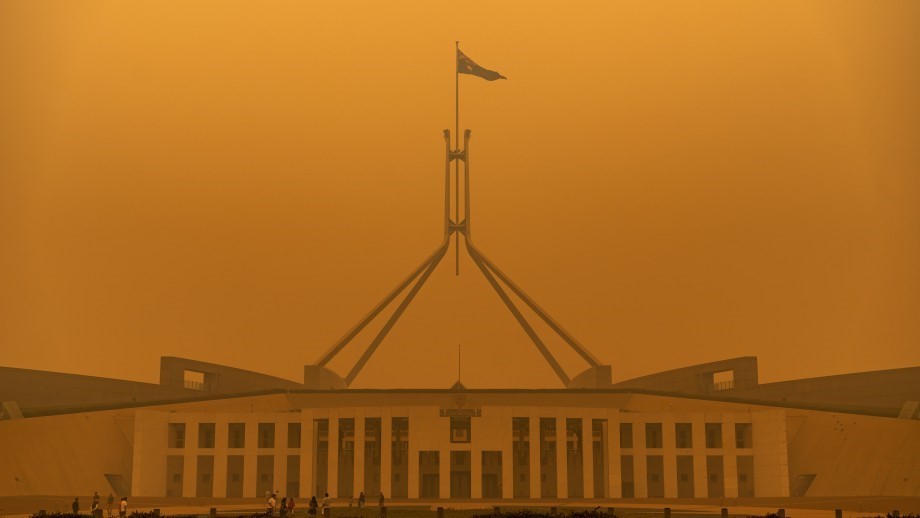You are here
Message from the Director 2020

Bushfire smoke shrouds Australia’s Parliament House in Canberra during the 2019-20 bushfire season. Credit: Jamie Kidston/ANU
Here in Canberra, 2020 started in a way that I and so many others will never forget – in a haze of thick, orange smoke caused by the fires burning across much of the country. Unfortunately, climate change has intensified three of the key factors that lead to extreme fire weather, namely dry fuel, high temperatures and dry air. We have good reason to be concerned about further climate changes.
In response, many Climate Change Institute (CCI) members have collaborated to directly address these threats, including via the award-winning Bushfire Impact Working Group and the ANU-Optus Bushfire Research Centre of Excellence, which is working on early detection and extinguishing of bushfires.
Whilst 2020 has been defined globally by the COVID-19 pandemic, it is now also tied with 2016 as the warmest year on record. This is in spite of the onset of the La Niña climate pattern that tends to low global temperatures. The La Niña event has also brought much needed rain to many areas of Australia, providing respite from drought conditions and boosting agricultural production.
Despite 2020 being the equal hottest year on record, I’m feeling more optimistic about our collective future due to recent announcements from four of our major trading partners (China, US, Japan and South Korea) that they are aiming for net zero emissions by 2050 (or in China’s case 2060) joining existing key trading partners such as the EU and NZ.
All Australian states and territories also now have net zero emissions targets by 2050 (or 2045 for the ACT). In the lead up to the UN climate negotiations in Nov 2021, the Federal government will come under increasing international and domestic pressure to declare their own 2050 net zero target and to develop and implement some serious emission reduction strategies that bring co-benefits across our communities and environment.
Whilst we were unable to meet physically for much of the year, the Climate Change Institute has continued to deliver 29 public lectures and seminars, most of these virtually. We also witnessed growing appetite for media commentary by ANU researchers and demand for professional education around climate change, with more professional short courses scheduled for 2021.
One major highlight in 2020 has been the work around reducing the University’s own GHG emissions, which has been led by the CCI. As the National University, we have a responsibility to lead in line with world’s best practice on emissions reduction. The ANU Below Zero initiative aims to reduce our emissions to below zero as rapidly as possible and we anticipate that targets and a broad strategy will be announced in early 2021.
In 2020 we conducted our own impact evaluation and found that CCI activities help increase understanding of climate change among policymakers and the community, spark conversations, build trust and contribute to a more engaged and empowered community. I’d like to thank every one of you for interest in climate change - please keep engaging and discussing climate change with others.
2021 is shaping up to be a critical year on climate and energy, with the next UNFCCC Conference of Parties meeting to be held in Glasgow where it is anticipated that governments will ratchet up their emission-reduction commitments so as to make progress towards the Paris Agreement goals. Crucially, 2021 will demonstrate whether we ‘snap back’ to the pre-COVID-19 emissions trajectory, or instead use the situation to move to a more sustainable development pathway that clearly and constructively addresses climate change.
I’d like to thank every one of you for your interest over the past year - please keep acting on, engaging with, and discussing climate change with others.
This is the last annual report for the CCI in its current form. As of 1 January 2021, the CCI was merged with the ANU Energy Change Institute, and the Disaster Risk Science Institute, to form a new combined entity – the ANU Institute for Climate, Energy & Disaster Solutions. This means that in addition to our previous work on climate change, we’ll also be looking at energy change and disaster risk reduction. I look forward to engaging with you all across these topics in the coming year.
Prof Mark Howden, Director, ANU Climate Change Institute, December 2020







